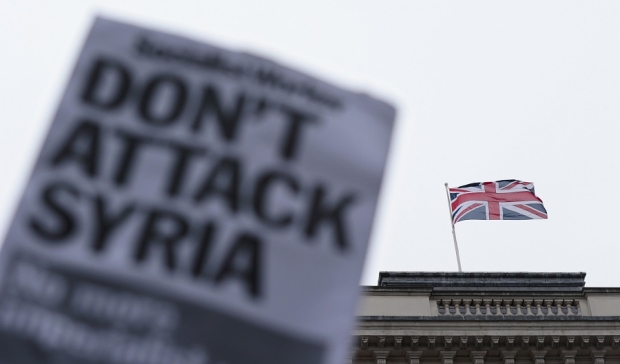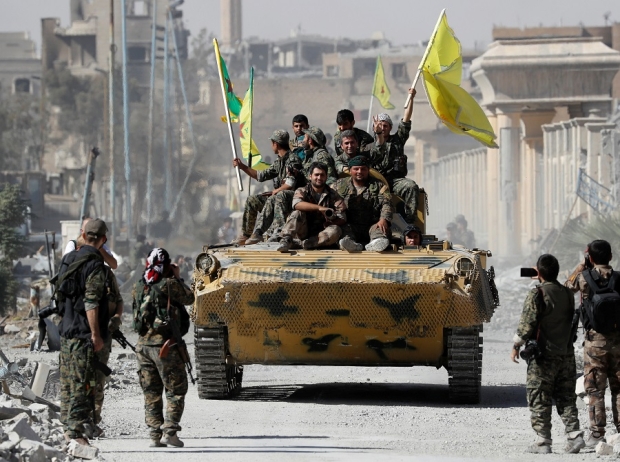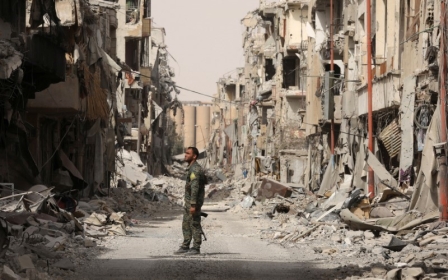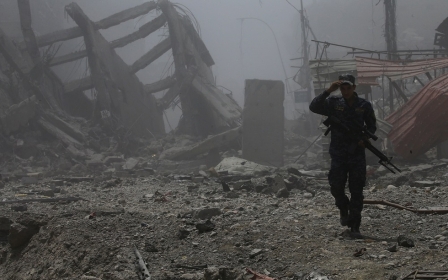Ex-spy chiefs back policy to kill British IS fighters, rights group says it's unlawful
Senior members of the British intelligence establishment have backed a call by a government minister for British Islamic State group members to be killed on the battlefield despite a rights group saying that the policy would be unlawful.
In an interview that represented a dramatic escalation in Britain's stance toward homegrown fighters, Foreign Office minister Rory Stewart said on Sunday that the threat they posed led to “very difficult moral issues”.
Stewart was asked by BBC Radio 5 Live to respond to remarks by Brett McGurk, the most senior US envoy to the coalition against IS, who said that he would ensure that every IS fighter who went to Syria would die in Syria.
“These are people who have essentially moved away from any kind of allegiance towards the British government,” said Stewart, a former infantryman and diplomat who served as deputy governor of two provinces in Iraq after the 2003 US-led invasion.
“They are absolutely dedicated, as members of the Islamic State, towards the creation of a caliphate. They believe in an extremely hateful doctrine which involves killing themselves, killing others and trying to use violence and brutality to create an eighth-century or seventh-century state.
“So I’m afraid we have to be serious about the fact these people are a serious danger to us, and unfortunately the only way of dealing with them will be, in almost every case, to kill them.”
A government spokesperson said that Stewart’s comments were consistent with remarks by Defence Secretary Michael Fallon who said two weeks ago that those who choose to fight for IS are a ”legitimate target and run the risk, every hour of every day, of being on the wrong end of an RAF or USAF missile.”
GCHQ and MI6 backing
Stewart's remarks come two weeks after the British government admitted that Sally Jones, known as the “White Widow”, and her 12-year old son were most likely killed by a US air strike.
The minister's comments were backed on Monday by the former director of the GCHQ intelligence agency who told MEE that coalition forces battling IS were left with “no alternative".
Sir David Omand said: “I think the minister was stating the obvious when considering the Iraqi and Syrian battle space over which IS has continued to fight with suicidal determination. The remaining IS fighters, including those from the UK, choose death by continuing their combat rather than surrender leaving no alternative to the coalition forces opposing them in Iraq and Syria but to fight them to the death.”
'The remaining IS fighters, including those from the UK, choose death by continuing their combat rather than surrender leaving no alternative to the coalition forces opposing them in Iraq and Syria but to fight them to the death'
- David Omand, former director of GCHQ
Asked if this could lead to the killing of innocents, Omand said that while the Geneva Convention was clear about the duty to protect civilians, “they cannot claim non-combatant immunity if they take sides and participate in hostilities, as sadly some women and children in IS have.
“Each case will need to be assessed on its merits.”
Richard Barrett, MI6’s former director of global counter terrorism operations, said that the policy shift was “yet another way that violent extremism challenges the fundamental values of our society.
“I think it is an expression of the complexity of dealing with foreign fighters and their possible return that a minister of the British government, a country which prides itself on the importance of the rule of law and has a developed legislative and judicial system - that does not include capital punishment - should advocate the killing of British citizens without trial or further examination of their actions or motives."
'Confused and concerning'
But a rights group that recently took the government to court for refusing to disclose the legal advice that formed the basis of an unprecedented UK drone strike that killed two British citizens in Syria in August 2015, said the comments were part of a pattern of “confused and concerning” statements from the government.
Yasmine Ahmed, executive director of Rights Watch (UK), said Stewart’s comments raised concerns about the legality of the UK government’s lethal targeting policy. "It is certainly not lawful to have a blanket policy permitting the government to kill anyone in Syria who endorses the ideology of ISIS or rejects allegiance to the British government," she said.
"There is also uncertainty about whether the government’s policy applies beyond the conflict in Iraq and Syria. This forms part of a pattern of confused and concerning statements from the government about when it will kill in our name. There is no room for ambiguity: the government’s policy must be crystal clear and consistent with their international legal obligations."
Fabian Hamilton, the shadow minister for peace, called for further clarification from the government over what he says could be a shift in government policy and support for the death penalty for the crimes of British citizens.
“My view, which is also the Labour Party’s view, is that however appalling the crimes committed by British citizens, we believe in the rule of law, and therefore a proper and fair trial in a court. and we don’t support the death penalty under any circumstances," said the Labour MP.
'My view, which is also the Labour Party’s view, is that however appalling the crimes committed by British citizens, we believe in the rule of law, and therefore a proper and fair trial in a court and we don’t support the death penalty under any circumstances'
- Fabian Hamilton MP, shadow minister for Peace
Speaking Monday on BBC’s Daily Politics, Labour MP Preet Gill said that authorities needed to first look at the evidence before acting because not everyone who went to Iraq and Syria went there went to fight.
“I think we need to look at the evidence and I think that’s the crux here. Have we got the evidence to say they did go and fight before we make that decision?
”They may have changed their mind once they got out there and realised that actually this is not what I signed up for.”
'huge risk'
British officials estimate that 350 of the 850 people who travelled to support or fight for militant groups in Syria and Iraq, have returned to the UK. Government officials have said that returnees present a “huge risk” but as of October 2016, just 14 had been convicted.
It is also unclear how many are still alive after a deadly coalition bombing campaign and vicious ground fighting that has ousted IS from its Iraqi capital in Mosul and Raqqa, its capital in Syria.
According to an Iraqi army major who spoke to MEE under condition of anonymity in Mosul, Iraqi forces killed most IS militants remaining in the city after it was taken by coalition-backed forces in July.
"It was not the right thing to do," he says. "They gave themselves up, and we just killed them."
New MEE newsletter: Jerusalem Dispatch
Sign up to get the latest insights and analysis on Israel-Palestine, alongside Turkey Unpacked and other MEE newsletters
Middle East Eye delivers independent and unrivalled coverage and analysis of the Middle East, North Africa and beyond. To learn more about republishing this content and the associated fees, please fill out this form. More about MEE can be found here.






